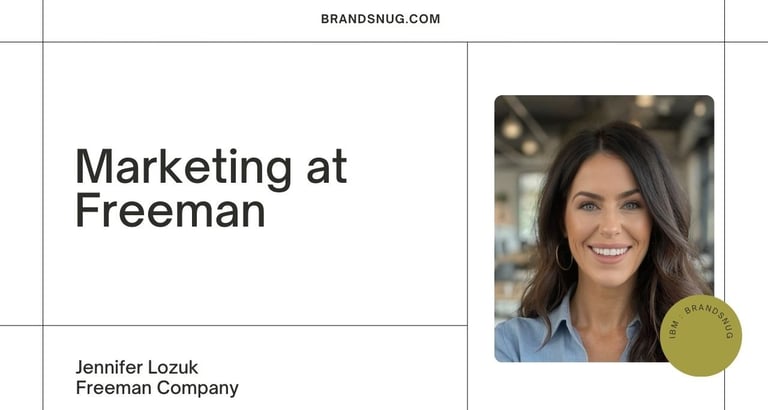How to Start a Career in Marketing: Beginner Lessons from Jennifer Lozuk
Discover beginner-friendly career advice from Jennifer Lozuk, Client Solutions Manager at Freeman Company
2 min read


How to Start a Career in Marketing & Client Engagement: Lessons from Jennifer Lozuk
If you’re a student or fresh graduate wondering how to start a career in marketing, events, or client engagement, you’re not alone. Breaking into this industry can feel overwhelming—so many roles, so many skills, and so much competition.
On Brandsnug, we spoke with Jennifer Lozuk, currently a Client Solutions Manager at Freeman Company, about her journey. From starting as a Leasing Consultant to becoming a leader in marketing, events, and lifestyle services, Jennifer shares her advice for anyone who is just beginning.
Here’s what beginners need to know.
How Did Jennifer Start Her Career?
Like many young professionals, Jennifer didn’t have a “perfect plan.” She began her career as a Leasing Consultant at Hillwood, where her role was to interact with people, understand their needs, and find solutions.
That early experience taught her two lessons every beginner should know:
Listen more than you talk – understanding client needs is step one.
Build people skills – communication and empathy will carry you anywhere.
From there, she moved into community engagement and lifestyle services at FirstService Residential and Guardian Association Management. Eventually, she stepped into client solutions at Freeman, where she now designs and delivers impactful brand experiences.
“Careers don’t always follow a straight path. What matters is saying yes to opportunities and learning transferable skills along the way,” Jennifer shares.
What Does a Client Solutions Manager Actually Do?
If you’re new to the industry, the title might sound intimidating. But here’s how Jennifer breaks it down:
Understand the client’s goals (what do they want to achieve?)
Work with internal teams to create strategies and solutions.
Balance creativity with data to design impactful brand experiences.
For beginners, the takeaway is simple: your first job may not be about big strategies, but about supporting these processes and learning how they work.
What Skills Should Beginners Focus On?
Jennifer says fresh graduates often overthink technical expertise and overlook the basics. Her top three skills to focus on early:
Communication – the ability to express ideas clearly and listen actively.
Digital literacy – understanding how social media, analytics, and digital tools drive marketing today.
Problem-solving – the ability to stay calm, think fast, and find solutions.
“Don’t wait until you feel 100% ready—say yes, then figure it out. Growth happens outside the comfort zone.”
How Important is Networking for Beginners?
Many young professionals hesitate to network because it feels “too soon.” But Jennifer insists it’s never too early.
Start with small steps—connect with peers, alumni, or mentors.
Show genuine curiosity instead of asking for favors.
Remember that authenticity builds stronger long-term connections.
“Most of my opportunities didn’t come from job boards—they came from relationships I built over time,” Jennifer explains.
What Mistakes Should Beginners Avoid?
Jennifer highlights two common beginner mistakes:
Trying to do everything alone – teamwork and collaboration are key.
Waiting for the ‘perfect’ role – every role, even entry-level, teaches valuable lessons.
Instead of waiting, start where you are, learn fast, and keep moving forward.
What Trends Should New Professionals Keep an Eye On?
For newcomers curious about the industry’s future, Jennifer points out three trends:
Hybrid events – combining live and virtual engagement.
Personalization – creating experiences tailored to specific audiences.
Sustainability – making marketing and events eco-friendly.
Understanding these trends helps beginners align their learning with where the industry is heading.
Jennifer’s Final Advice for Beginners
If Jennifer could leave one message for anyone entering the industry, it would be this:
“Invest in relationships. Skills evolve and industries change, but the connections you build—based on trust and authenticity—will shape your career
